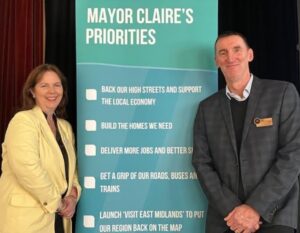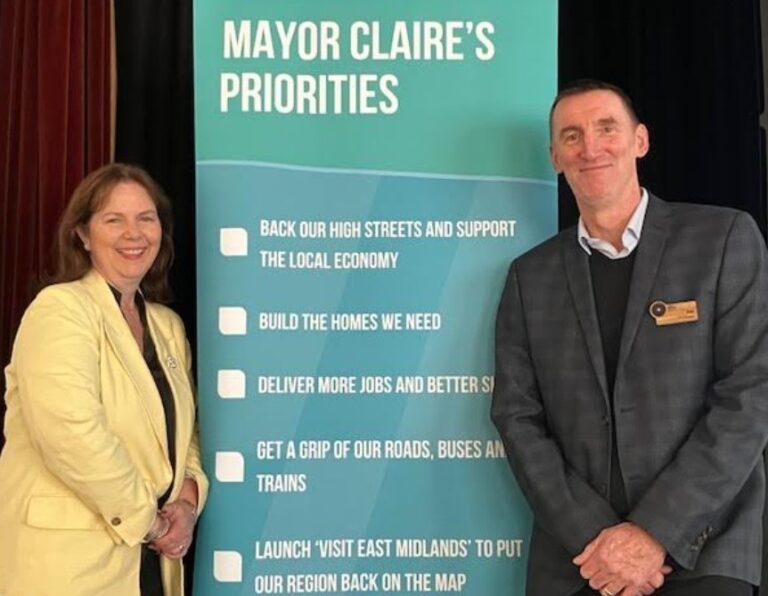
East Midlands Mayor Claire Ward joined forces with Peak District National Park Chief Executive Phil Mulligan to hear from council leaders at a packed event about the travel and transport challenges faced by their communities in Derbyshire’s Peak District and how they might be overcome.
The East Midlands Combined County Authority’s mayor hosted the event at Bakewell Town Hall on November 19 as part of the new Peak Partnership between the EMCCA, Greater Manchester and South Yorkshire mayoral areas which aim to support the Peak District with improved cross-county transport links to boost visitor economies, education and skills training.
Ms Ward said: “The Peak Partnership is an attempt by myself, Mayor Andy Burnham in Greater Manchester and Mayor Oliver Coppard in South Yorkshire to collaborate on an area not of just outstanding beauty for all three of our regions but a place where a lot happens whether its people coming into the region from either Manchester or South Yorkshire or from my region.”
She told guests including council leaders from Derbyshire Dales, High Peak, and surrounding districts, bus and rail operators, tourism agencies, community organisations and national park representatives that the Peak Partnership is keen to address and ‘unlock’ the travel and transport challenges faced in the national park but this is something it cannot do on its own.
Many of the challenges faced by the largely rural Peak District include residents and visitors’ parking problems, congestion, train capacity, reliable, available and affordable public transport including buses as well as rail and bus coordination and connectivity, as well as the need for better sustainable transport with Active Travel infrastructure for commuters and cyclists.
Ms Ward said: “I hope this will flag up the challenges people face with transport or parking or congestion and hopefully it will flag up possible solutions. But we are also promoting, today, the transport consultation. On Monday (November 17), I launched the transport plan and I want to hear from as many rural parts as well as cities.”
She added that she wants to see better transport links across rural and urban areas and stronger digital connections to support the economy and to sustain jobs while protecting the environment and for youngsters to be able to thrive and not have to leave the area.
Ms Ward said she wants an affordable and accessible public transport system, better connectivity and well-maintained highways.
She added that the three mayors want to be able to collectively make a strong case with the Government for support with some of the issues relating to the Snake Pass and the Woodhead Pass and she added there is money planned to be going into improving the Snake Pass.
The Government’s Department for Transport announced in July the allocation of £7.6m of funding to deliver improvements on the A57 Snake Pass route between Sheffield and Manchester.
Ms Ward said: “We made the case collectively as the three mayors that something like the Snake Pass, which is a road of significance not just to Derbyshire but to Manchester and South Yorkshire and beyond, is a major route. The responsibility should not fall solely on to Derbyshire County Council.
“Whilst more money is allocated for the Snake Pass this is an ongoing challenge and as we head into winter we may find days when the Woodhead Pass and the Snake Pass are closed and that is major links across the regions.”
Overall, EMCCA says it wants to build a resilient rural transport network, improve and expand public and active travel options for communities, and unlock the full potential of the Peak District’s visitor economy to support growth.
Ms Ward said: “The visitor economy is huge. We get people from South Yorkshire and Greater Manchester to enjoy it at weekends and that causes congestion but we want people to come and visit and we have brilliant visitor businesses in the visitor economy who need the support and the visitor economy is one of my five pillars in the growth plan.”
However, she added that the visitor economy has to be sustainable because residents need to continue to live in an environment where they do not feel they have to stay indoors and cannot get their cars off their driveways.
Ms Ward also highlighted the importance of the massive PEAK Gateway Resort being built on land at The Brushes, off Sheffield Road, in Chesterfield, on Green Belt land, near to the A61 Dronfield bypass and Unstone Green, and on the border with the Peak District.
The scheme boasts hundreds of car parking spaces but campaigners have been concerned it will bring an increase in traffic congestion although there are hopes many of the visitors will come by shuttle bus or train.
Peak District National Park Authority Chief Executive Phil Mulligan said the Peak District can bring a great sense of happiness for visitors but through inaction there is also a risk of harming the area with issues about how people travel to the region, where they go and how they behave.
He told the meeting: “So we have some choices to make and what do we want our legacy to be? How proud or satisfied would you feel if your contribution was to a national park full of nature with beautiful, preserved places and a generation of young people who care predominantly about the environment?”
Mr Mulligan stressed those with an interest need to get more people in and out of the Peak District without using cars so there is a need for effective, reliable, affordable and desirable integrated public transport that supports a growing economy but at the same time car parking needs to be increased too.
Greater Manchester’s successful integrated transport system, the Bee Network, which covers coordinated bus, tram, cycling and walking travel routes with faster and seamless travel under a contactless tap and go system is soon to be extended to Derbyshire’s Glossop, Hadfield and Buxton areas to avoid the need for multiple different tickets.
Ms Ward said that thanks to the partnership with Greater Manchester Mayor Andy Burnham youngsters are soon going to be able to use bus passes to get to schools and education in Greater Manchester and they will be able to do so for free.
She said: “That simple change just removes so many barriers and that is the kind of practical and life-changing improvement that we want the Peak Partnership to deliver for rural communities so they are not left behind.”
The Peak Partnership will no doubt be considering the Manchester Piccadilly to Sheffield rail line which makes several stops in the Peak District including in Hope, Bamford and Edale and Greater Manchester has plans to bring rail into its Bee Network for services to Glossop, in the Peak District, scheduled to be completed by 2026.
Derbyshire and Nottinghamshire residents, businesses and community groups are also being urged to take part in EMCCA’s 12-week transport consultation so their views can help shape and be part of the authority’s plans to make public transport easier and affordable with upgraded highways and a reduction in car use.
Ms Ward said: “I cannot do this alone. When we make change we have to make change together and we have to be driving that change through in each of our organisations and communities as well.”
EMCCA aims to produce a Local Transport Plan to set a direction and guide investment decisions and after considerable engagement, including a workshop with its transport committee, the Mayor’s Big Transport Conversation public consultation was launched on November 17 which runs until February 8, 2026, and is available via its website www.eastmidlands-cca.
The authority, which is due to take over responsibility for transport from the Derbyshire and Nottinghamshire authorities, has a Transport and Digital Connectivity Committee which is overseeing plans to allocate £2bn of transport funding for the Mayor’s Transport Plan which has a 15-year vision and aims to address challenges faced by rural communities.






